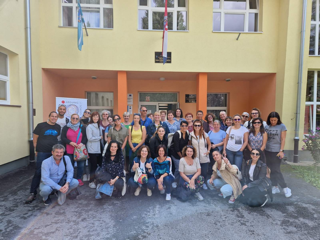by Elena Passerini
The Arguing at School Consortium emerged strengthened from a full week of Training/Learning/Teaching Activities.
The Croatian partner school Ivan Goran Kovačić in Vrbovsko organized the days both at its premises, involving some students and numerous teachers, and in the nearby town of Ogulin. The group of participants came from Malta, Italy, Romania, Slovenia, France, and various parts of Croatia. In addition to the 5-day training involving teachers sent from partner schools and a wide representation of partners, numerous new teachers were also involved. An evening public meeting, organized at the library in Ogulin, allowed representatives of schools and local stakeholders to learn about our three methods in Croatian and English, including video testimonies. The two-day workshops within the LTTA reserved some places for some local teachers, who could then start some experimentation. Five other schools were also involved in various ways, including the four pilots, the mayor of Ogulin, three head teachers, and a regional head officer.
Monday was dedicated to plenary work, to form the group and deepen the basic elements common to all methods. Emotional competence and the concept of conflicts and quarrels, quite distinct from war and violence, are the two key concepts that make arguing a resource for education.
On Tuesday and Wednesday, in three parallel open groups, the main methods used by pilot schools: Litigare Bene by Daniele Novara, Peer Mediation, and Friendship Cards by Relationships Are Forever Foundation (Malta) were explored in workshops. After an intensive day dedicated to one method, the participant groups will be able to start introducing at least one new method or tool in their school during the school year.
The program was elaborated in a long sharing process by the group of trainers. The aim is choosing and synthesizing the most useful elements for the transferability of the methods, relying on the common assumptions and the practical benefits derived from their application, both for teachers and students, and the experience gained over the years around each of the methods.
Thanks to the presence of Paola Cosolo Marangon, we have also added a fourth pedagogical tool, which is very useful for introducing rituals and rules into the classroom that give space and time to the problems and conflicts that the class group experiences. The responsibility and abilities of each student can be developed with the Cooperation Council, which creates a collaborative climate in the classroom. It contains and deals with difficulties, enhancing the potential of each individual and the group. It is an activity that originated in schools inspired by Freinet’s pedagogy and described by the Canadian Danielle Jasmine.
On the final day on Friday, the teachers worked intensively in two focus groups and an evaluation session. They discussed the strengths and limitations of the methods, considering both the foreseeable obstacles to change and the schools’ most motivating benefits and needs. Then they were able to give their messages to the entire consortium gathered for the regular Transnational Project Meeting on Friday morning. Their messages and suggestions will serve to broaden the pedagogical perspective on the potential opened up by the Project.


